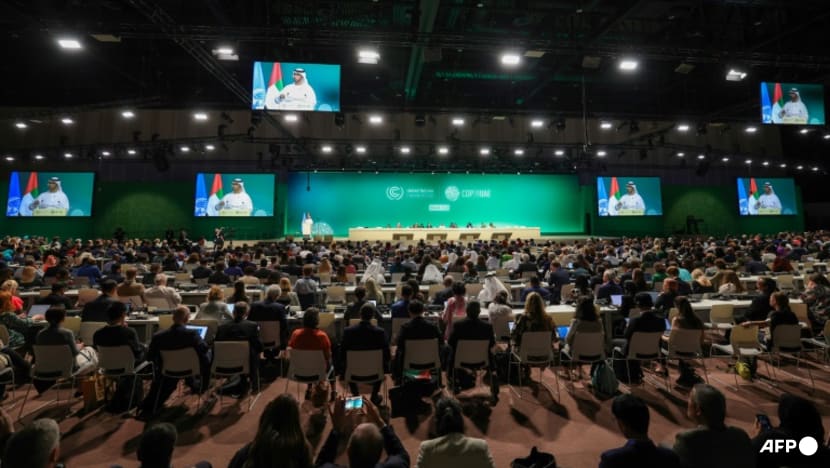Beyond the presence of leaders at COP28, action and commitments are needed: Former UN climate chief
Although there has been progress in the fight against climate change since the Paris Agreement was adopted, “science is telling us that we are not yet there, where we need to be”, says Ms Patricia Espinosa.

More than 140 world leaders will speak at the COP28 climate talks. (Photo: AFP/Giuseppe Cacace)

This audio is generated by an AI tool.
The presence of world leaders at United Nations climate conferences always sends “a very powerful message”, but beyond that, their actions and their commitments, especially on finance, are also important, former UN climate chief Patricia Espinosa said on Thursday (Nov 30).
She was responding to a question on the absence of United States President Joe Biden and his Chinese counterpart Xi Jinping from the high-profile COP28 during an interview with CNA’s Asia Tonight.
“In many ways, (it is) leadership by China and the US that has helped put together many of the deals that have brought the process forward,” said the former executive secretary of the UN Framework Convention on Climate Change.
“Finance is a catalyser for climate action, so we would need to see the willingness to fulfil the commitments that developed countries have made about finance, but beyond that, also to increase contributions towards adaptation,” she added.
The US’ John Kerry and China’s Xie Zhenhua – the climate envoys the world’s top two economies and emitters sent to COP28, which began in Dubai on Thursday – have made “incredible contributions” to the process of reducing carbon emissions as agreed in the Paris climate deal in 2015, she said.
Under the Paris Agreement, the aim is to limit the rise in global temperatures on Earth to 1.5 degrees Celsius.
Climate scientist Mark Howden said that having leaders of the calibre of Mr Biden and Mr Xi is important in providing momentum and strength for conclusions at the meeting, but that it is possible to go forward without them, noting that they have domestic challenges to handle.
“Some of the pressures – they’re likely to be just holding them back, but I wouldn’t see a fundamental change in the results, either depending on their presence or absence,” the director of the Institute for Climate, Energy & Disaster Solutions at the Australian National University told CNA938.
FINANCING “LOSS AND DAMAGE” FUND
Financing by countries includes pledges to the “loss and damage” fund that was set up at COP27 to allow developed countries to contribute to the climate change efforts of developing countries, Ms Espinosa said.
It was a big political decision for many countries to accept it, “particularly the ones that know that, once the fund is established, they will have even more pressure to be providing funds”, she noted.
“We need to see the money coming in for the loss and damage fund because a fund without money is not going to be able to make any good, and we also need to see money going into the international financial organisations like the World Bank and the Regional Development Bank,” she said.
“At the same time, (we also need) a new way of operating that really makes financing accessible to those who need it.”
Ms Espinosa, who previously served as Mexico’s foreign minister and as the country’s ambassador to Germany, said she hopes that the recommendations made by the transitional committee on the operationalisation of the funding arrangements are accepted.
A very important feature of the recommendations is that beyond the national governments of developing countries, local governments, local authorities and even communities could benefit from them, she said.
“That’s a very, very novel feature of the recommendations,” she said.
Professor Howden said one hope for COP28 is that questions like who is likely to receive the money and under what circumstances and who is required to contribute money to the fund will be answered.
“There’s still significant uncertainty about how this is going to operate. And some of that, hopefully, will be resolved at this meeting,” he said.
FAR FROM CLIMATE CHANGE GOALS
The world has not been doing well in bringing down greenhouse gas emissions in the eight years since the Paris Agreement, said Prof Howden.
“This year, we’re expecting greenhouse gas emissions to break the previous record, which was set last year, which broke the previous record,” he said.
“So our greenhouse gas emissions aren’t coming down like they need to if we’re going to meet those Paris Agreement temperature goals. As a result, our global temperatures continue to increase.”
Ms Espinosa said that while there are geopolitical events that may distract nations from climate change, “we cannot wait to have an uneventful year to act on climate change”.
Related:
Although there has been progress since the Paris Agreement was adopted, “science is telling us that we are not yet there, where we need to be”, she said.
“We are actually very far from there. We need to come to this conference, we need leaders to come to this conference with a different mindset, with this consciousness that investing in climate action is investing in their own future, in their own communities’ future,” she said, adding that there is no way one nation alone can overcome the challenge of climate change.
“We need to see this new ambition by all leaders to work together in spite of so many other problems that we are all individually facing, to put the interest of humankind above the immediate interests, because at the end, it will hit us all.”














